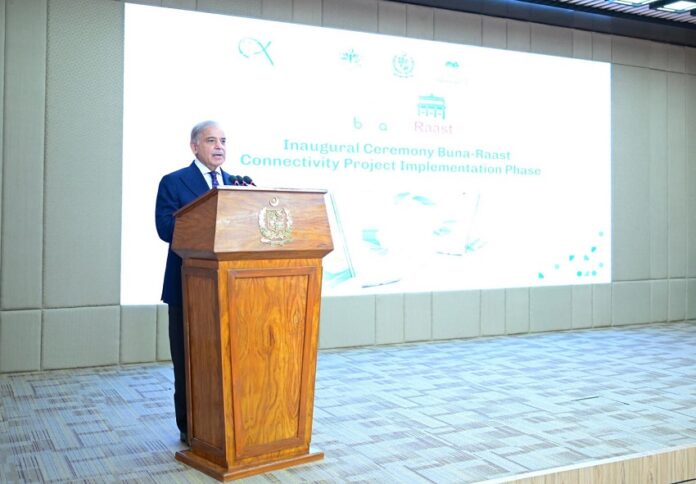Prime Minister Shehbaz Sharif on Thursday launched the Buna-Raast connectivity project to facilitate overseas Pakistanis in Arab countries in sending remittances through a swift, affordable, and effective mechanism.
Addressing the launch ceremony, the Prime Minister stated that the project would not only simplify the digital remittance process but also help boost Pakistan’s foreign exchange reserves.
Under the Buna-Raast connectivity project, the State Bank of Pakistan’s (SBP) Raast payment system will be linked with the Arab Monetary Fund’s Buna system to benefit millions of overseas workers, he added.
Calling it a significant step forward in promoting financial transactions through modern techniques, the Prime Minister said the project would expand the reach of Pakistan’s digital payment infrastructure.
“This signifies how 21st-century Pakistan is advancing by integrating modern technologies into people’s lives. This is the first cross-border real-time payment system linkage that will make remittances more affordable and accessible,” he remarked.
Moreover, Prime Minister Shehbaz mentioned that the project has the potential to evolve into a future model of a broader payment system, facilitating transactions across regions, with the potential for over $20 billion in annual payments.
Economic Revival Plan
The Prime Minister announced that he would unveil a five-year economic revival plan in the coming weeks, with broad parameters already finalized through months of deliberations with stakeholders. The “Home-Grown Economic Program” will include measures to boost the country’s economy by enhancing agriculture, information technology, and other untapped sectors.
“Our program is under discussion, and I will announce it very soon. Significant work has gone into it, involving discussions and deliberations with all stakeholders over the last several months. Recently, we have finalized its broad parameters. By next week or so, we will finalize it. I will present it to the people as the program for the next five years,” the Prime Minister said.
Highlighting the challenges of reforms in the Federal Board of Revenue (FBR) and the power sector, he informed the gathering that he is personally monitoring the digitization of the FBR and that the government is hopeful of positive outcomes from power sector reforms.
“There is no magic wand. It’s all about hard work, sacrifice, blood, and sweat. Our nation is resilient and strong. Our people are full of hope and energy. Let us work together. Let’s not waste time on debates as we have done in the past. Let us now focus on actual implementation on the ground. Insha Allah, you will see that we will reap dividends and find our rightful place in the community of nations through hard work, hard work, and more hard work,” he stated.
Earlier, the Prime Minister presented mementoes to the Chairperson of the Arab Monetary Fund, Dr Fahad Alturki; SBP Governor, Jamil Ahmed; President of the Bill and Melinda Gates Foundation, Dr Anita Zaidi; and CEO of Karandaaz, Waqasul Hassan.
In his remarks, Finance Minister Muhammad Aurangzeb said that macroeconomic stability is taking root in Pakistan’s economy, as evidenced by a reduced current account deficit, stable currency, improved foreign reserves, upgraded sovereign ratings, and revived investor confidence.
He emphasized the government’s commitment to infrastructural reforms, noting that its efforts are bearing fruit, though much work remains to be done. Remittances surged, with $3 billion received in July, he added.
Speaking about the Buna-Raast connectivity project, he said the digitalization would help bring transparency and reduce leakages in remittances, taxation, and the power sectors.
He added that the project would place the country on a sustainable path and align it with the requirements of the Financial Action Task Force (FATF).
Dr. Anita Zaidi, President of the Bill & Melinda Gates Foundation, stated that the project would digitally link the economies of Pakistan and the Arab world, boosting productivity and increasing efficiency within systems.
She further noted that it would improve individuals’ lives by making it cheaper to send money, thereby enhancing the economic conditions of families, with 90% of remittance receivers being women.
Dr. Zaidi also observed that the project would particularly benefit women entrepreneurs by enabling them to sell their goods and receive payments digitally.




